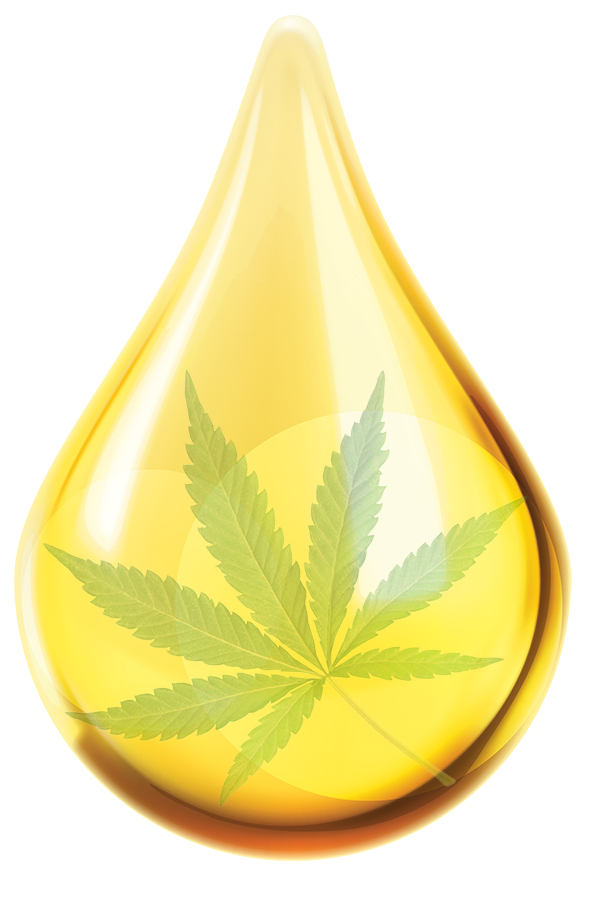 It’s advertised everywhere: on TV infomercials playing at fitness centers; in mailers from local mom-and-pop shops; on windows at gas stations and on electronic signs at vape shops. It’s the product known by three letters: CBD.
It’s advertised everywhere: on TV infomercials playing at fitness centers; in mailers from local mom-and-pop shops; on windows at gas stations and on electronic signs at vape shops. It’s the product known by three letters: CBD.
Cannabidiol, or CBD, is enjoying extraordinary popularity, spurred in the past year by the passage of a national 2018 Farm Bill that legalized the sale of CBD products. The law reclassified CBD from an illegal substance, monitored by the U.S. Justice Department, to a managed crop regulated by the Department of Agriculture.
Sales of CBD were on track to hit $5 billion by the end of 2019, a 706% increase since 2018, according to a report by Brightfield Group, a Chicago research firm focused on the legal CBD and cannabis markets.
As to the future, sales are expected to exceed $20 billion nationwide by 2024, according to BDS Analytics, another research firm focused on the global cannabinoid industry, and Arcview Market Research. “The forecast includes products sold through licensed dispensaries, pharmaceuticals, and in general market retail — from cafes and smoke shops to grocery stores, pharmacies and mass merchants,” the report states.
But this fast-growing fledgling industry is not without challenges: educating the public about the benefits of the product; overcoming the stigma of being affiliated with an illegal substance; quality control; and policy and regulatory hurdles. Last June, both the NH Department of Health and Human Services and the NH Liquor Commission announced CBD is not a permitted additive and cannot be added to food and drink. (That said, the presence of CBD in all kinds of edible products is readily available.)
What is CBD?
But let’s back up. CBD is a non-intoxicating compound derived from hemp. The Hemp Farming Act of 2018 allows the production of industrial hemp with a tetrahydrocannabinol (THC) concentration of no more than 0.3%.
THC is the psychoactive compound in marijuana that makes users feel high. Since that law change, hemp oil has been widely adopted as a supplement used in tinctures and lotions that claim a bevy of health benefits, from relieving pain to reducing anxiety and inflammation and inducing sleep. CBD manufacturers and retailers interviewed for this article stress they make no medical claims about their products. And they say while people of all ages are trying CBD products, the majority of their clients are age 60 and older looking for pain relief.
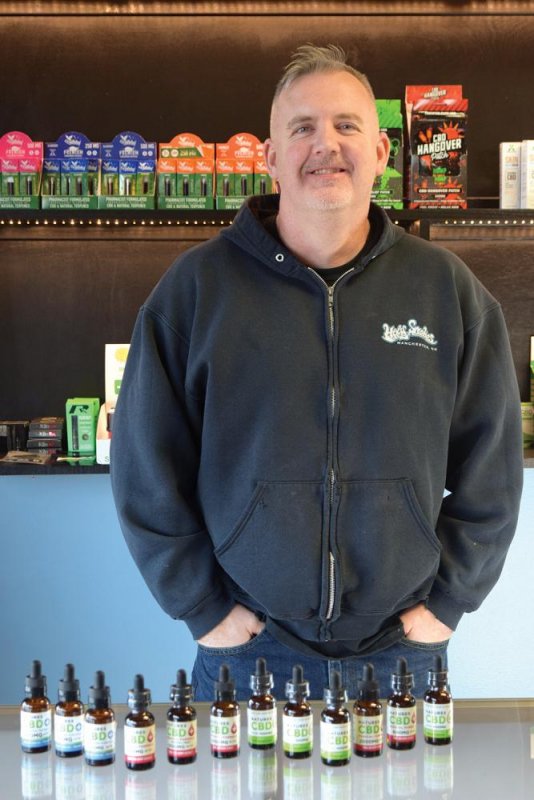 CBD interacts with the endocannabinoid system to “maintain bodily homeostasis through millions of cells throughout the body” and interacts with receptor cells to “repair them quickly,” says Michael Johnson (pictured), CEO of Holy Smokes and Nature’s Pure CBD Oil, both in Manchester.
CBD interacts with the endocannabinoid system to “maintain bodily homeostasis through millions of cells throughout the body” and interacts with receptor cells to “repair them quickly,” says Michael Johnson (pictured), CEO of Holy Smokes and Nature’s Pure CBD Oil, both in Manchester.
When asked why people use CBD products, Kirby Mastrangelo, owner of Hempire, says, she encourages people to research the endocannabinoid system to see how CBD products may help them.
The Business Behind CBD
From retailers to manufacturers, CBD is launching a new wave of entrepreneurs in NH and it is finding its way into a variety of products. Johnson was an early entrant into the CBD scene. He says he built his business by riding trends and knowing when to pivot. Holy Smokes opened in 2009 as a cigar store, then refocused on vaping products and has since added CBD to its mix. In 2013, he launched Nature’s Pure CBD Oil, which distributes CBD products manufactured in Philadelphia.
Johnson became aware of CBD six years ago after a relative used CBD oil to calm anxiety. The relative’s results made him a true believer. Now 40% of sales at Holy Smokes come from CBD products. Nature’s Pure CBD Oil now has 600 accounts nationwide and Johnson says most of that business is tinctures—oil dropped under the tongue.
While CBD businesses were not prevalent when Johnson delved into the market, he says competition is now stiff. “The market has become saturated.”
Hempire, which is growing, has two stores in Massachusetts and recently opened two more in NH. There are also national chains like CBD American Shaman, a nationwide franchise with seven retail outlets across NH. They sell tinctures, topical creams and dog treats. As of October, CBD American Shaman franchised 352 stores with more than “400 stores coming soon,” according to its website. Four of those stores will open in Nashua (two locations), Portsmouth and Rochester.
Casey Stingel, a franchise owner of three stores, was initially a customer who tried American Shaman’s CBD products to address anxiety issues and found it worked. He then decided to open a shop in Londonderry last March with an initial investment of $30,000.
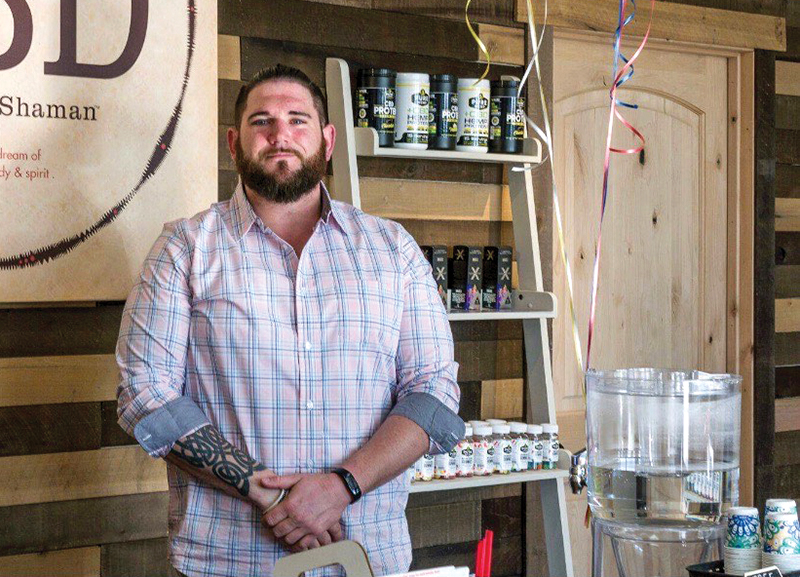
Casey Stingel, owner of three American Shaman stores in NH. Courtesy photo.
Stingel says it only took a month to realize a return on his investment with $64,000 in sales. In month two, he brought in $80,000. Prospective owners have to pay a one-time franchise fee of $10,000 along with a recurring monthly fee of $1,000 for local promotion. Finally, the cost for the initial inventory from CBD American is about $10,000.
Mastrangelo, a former school secretary, decided to open a small CBD store, Hempire, in 2017 in Methuen, Mass. selling a handful of products after using CBD to treat the pain in her face caused by trigeminal neuralgia. She and her husband, Rocco, a former firefighter, cashed out their 401(k)s to take a chance on this fledgling industry. The gamble paid off and Hempire quickly grew into its name with four stores, including 1,200-square-foot stores in Portsmouth and Exeter that opened in 2019. The stores sell more than 75 different products and employing 13 full-time.
Mastrangelo says when she launched Hempire she experienced what is known as NIMBYism (Not In My Backyard) with landlords and municipalities not wanting a CBD store in their towns. But, she notes, that has changed dramatically. She says both Portsmouth and Exeter have welcomed Hempire stores in their downtowns.
Mastrangelo says people visited her shops out of curiosity, wary of the products because of misinformation and stigma. Then, as people tried the products, they shared the results with friends and the business quickly grew, she says. Now, more people come in armed with information, knowing what they want, Mastrangelo says.
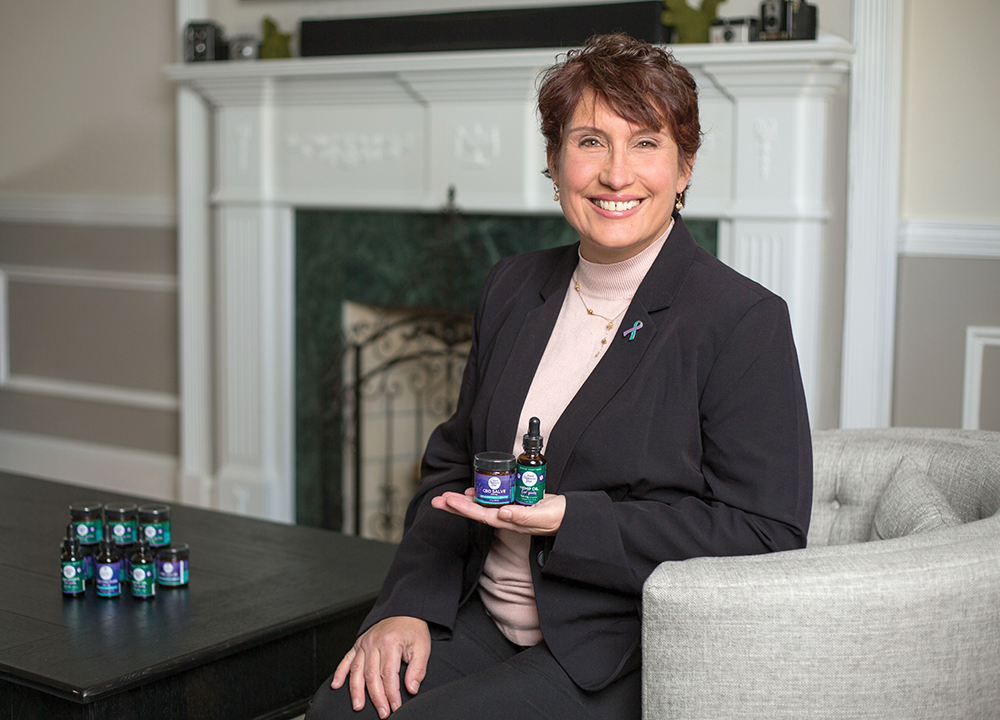
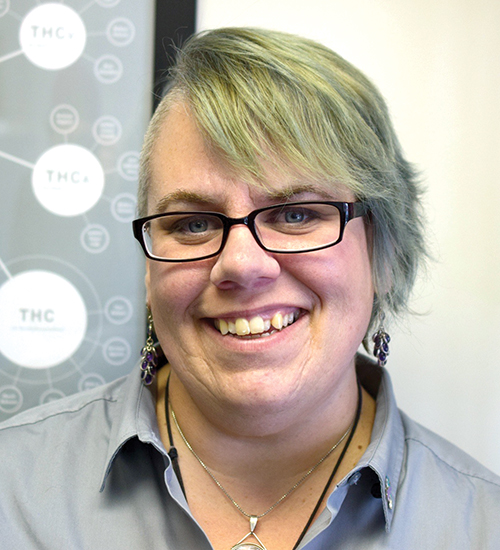
From left: Clearly Balanced Days co-founders Tina White and Carrie James. Courtesy photos.
Clearly Balanced Days in Belmont makes and sells CBD products through wholesale accounts, online and at fairs and expos. When the company started, co-founder and owner Tina White was working an office job and selling CBD products on the side. She says she launched the company with her business partner, Carrie James, in late 2017. It was funded by their savings and “a couple small investments from people who believed in us,” White says.
Since then, Clearly Balanced Days has landed its tinctures and lotions in more than 60 stores as well as at spas, salons and healthcare practitioners in NH and six other states. Their products are non-GMO, made from 100% USA grown organic hemp and contain no THC, pesticides or solvents, White says. “Nothing is in there that doesn’t need to be there,” James says. Prices depend on the amount of CBD milligrams in their product and range from $12 to $150. Their product line includes five tinctures, a balm and two salves for people, as well as three tinctures and a breath spray for pets.
Angel investors, like SLC Group Holdings in Nashua, are watching the market and SLC even invested in Clearly Balanced Days. “We exceeded last year’s [2018] gross sales in the first quarter of this year and we are on track to continue that trend,” White says. “We’ve quadrupled our sales since [2018] and we are hoping to do the same thing this year.” She adds they are on the cusp of going national, working with a major distributor and negotiating with regional and national chains.
Setbacks and Red Tape
The U.S. Food and Drug Administration (FDA) is examining CBD-related products. “The FDA has significant interest in developing therapies for consumer products but they are aware some are selling products with cannabis or cannabis products in them that can be hazardous to consumers,” says Jim Reidy, an attorney with Sheehan Phinney in Manchester. “The FDA is saying buyer beware.”
In 2019, the FDA issued several warning letters to producers of CBD producers across the U.S. for misrepresenting what is in their product, Reidy says. The FDA website mentions a Mass. company, Curaleaf, that received a warning for “illegally selling unapproved products containing cannabidiol online with unsubstantiated claims that the products treat cancer, Alzheimer’s disease, opioid withdrawal, pain and pet anxiety, among other conditions or diseases.”
“We recognize that there is significant public interest in these products, for therapeutic purposes and otherwise. At the same time, there are many unanswered questions about the science, safety and quality of many of these products. As we approach these questions, we do so as a science-based regulatory agency committed to our mission of protecting and promoting public health,” states Amy Abernethy, principal deputy commissioner, and Lowell Schiller, principal associate commissioner for policy, in an online post on the FDA website last July.
Businesses have also been under fire for selling CBD-infused food and drinks. It is illegal to sell food with added THC and/or CBD though consumers can purchase CBD edibles with relative ease, primarily because each state must determine how to oversee CBD product sales as the FDA finalizes its research.
Meanwhile, in NH, there are 15 cities, like Rochester, conducting their own food inspections. Remaining towns are inspected by the state.
The NH Department of Health and Human Services (DHHS) reminded self-inspecting municipalities last year that CBD is not a permitted food additive. The city of Rochester cracked down on sales of consumable CBD products and some other cities followed suit.
“New Hampshire must comply with FDA Food Code. The FDA recently announced that given the lack of scientific research demonstrating the benefits of CBD as a food additive, federal law prohibits the addition of CBD to food products. Given the current FDA Food Code, CBD is not permitted as a food additive in New Hampshire,” says Jake Leon, director of communications for DHHS.
Among those affected by these regulations is Vera Roasting Company in Manchester. In addition to selling its flagship coffee infused with the antioxidant resveratrol, Vera Roasting began selling a “wellness blend,” combining CBD and resveratrol.
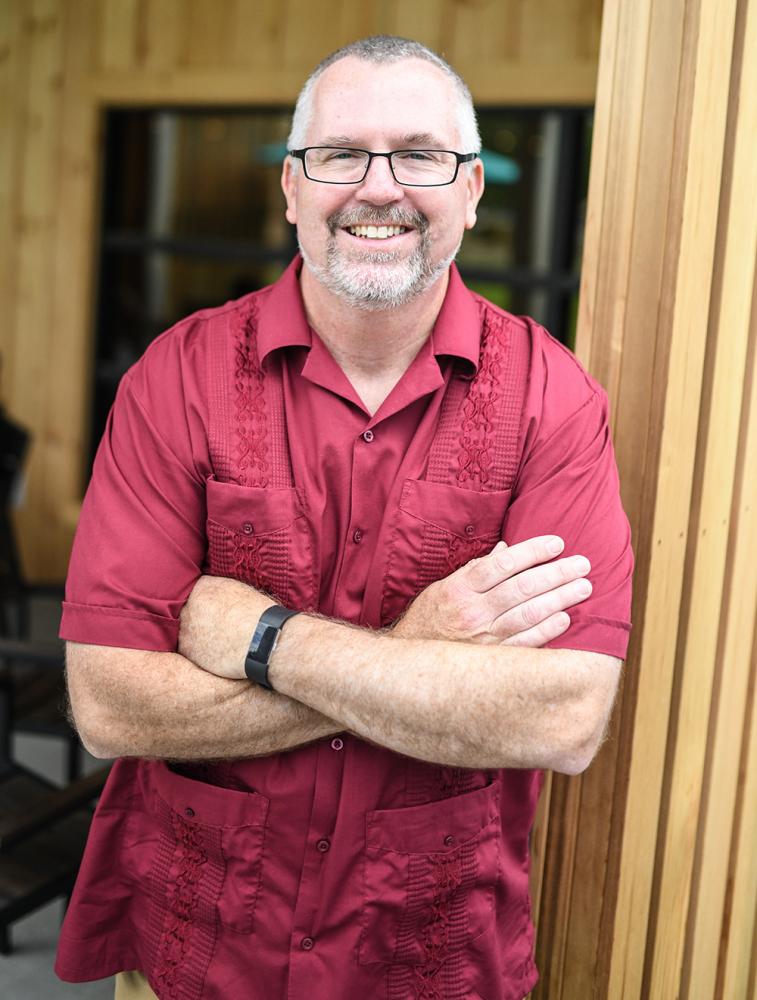
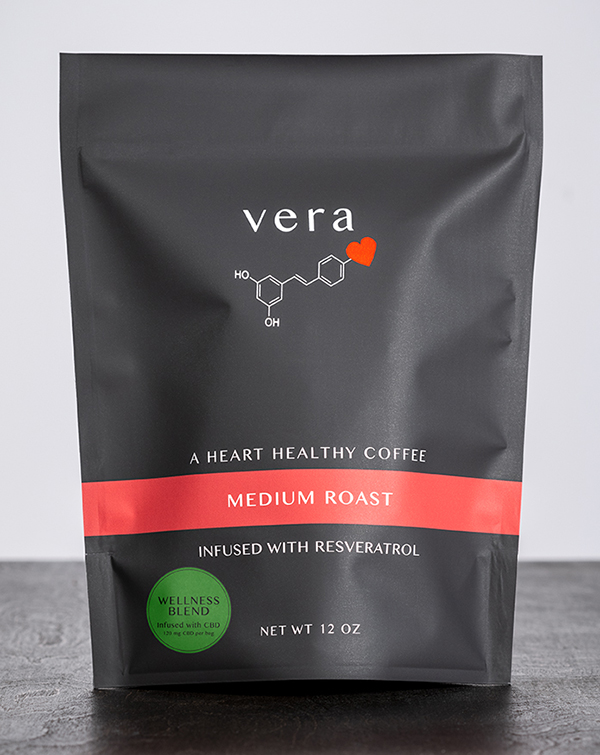
From left: Glen Miller, co-founder of Vera Roasting. A bag of Vera’s “Wellness Blend” combines CBD and resveratrol.
Dr. Glen Miller, founder of the coffee company, does not sell the CBD-infused blend online but rather directly to consumers through telephone orders. In compliance with the NH DHHS guidelines, the company says it does not sell to NH customers. Even with this restriction, Vera Roasting continues to grow.
“Our current [year-over-year] growth is 50%,” Miller says, though he notes the restriction complicates matters. “New Hampshire-based customers are confused and frustrated by the state’s rules and their uneven enforcement,” he says. “They do not understand why it is OK to purchase CBD edibles online from out-of-state vendors, but not from New Hampshire-based vendors like Vera Roasting.”
These restrictions also stunted the growth of Clearly Balanced Days (their original name was Clearly Better Days) just as they were getting off the ground. White and James had worked with local businesses to create CBD-infused honey and maple syrup they brought to health food stores and other retailers. However, the state informed them they could not sell edible products infused with CBD. “A couple weeks later, we got that letter from the Department of Health and Human Services,” White says, trailing off and shaking her head. “We’re trying to play by the rules. We want to be part of the conversation in creating regulations.”
Competing on Quality
Another challenge for those trying to sell quality, legitimate products is competing with those companies that don’t play by the rules. Many of the business owners interviewed say their biggest competition is with stores that claim to sell CBD but are selling something else. “We’re actually hoping for some regulation,” Stingel says. “We go through the testing and pay attention so that when the FDA releases their report, we’ll be ready.”
Johnson says there is a lot of mislabeling and “shady stuff in the market.” He adds, “If it’s cheap, it’s not formulated right.”
And he says he worries about future regulations and whether these could hamper the market. “No one knows what they are going to do,” he says of possible government intervention in the industry.
To prepare, Johnson says he is developing products and marketing strategies that will allow his business to continue. “If we need to relabel or rebrand, we can do it.”
Mastrangelo says it’ “disheartening” to know there are sham products being sold. “We try to stay up to date on regulations. We want to be a compliant business,” she says.
James says Clearly Balanced Days invested about $10,000 since September in testing its batches. “We test for potency to make sure it has [the stated amount of] CBD. We also test for heavy metals, solvents, pesticides and microbials,” White says, as well as to ensure there is no THC. The company only uses ISO-accredited testing labs.
Clearly Balanced Days went as far as changing its labels to include a QR code that brings a customer to its website where they can enter a batch number and view test results.
White says consumers need to read CBD product labels to see if they contain THC or not and, if it does, how much. “We remove the THC for peace of mind. Some people are drug tested for their livelihood. Our products don’t come up on drug tests because there is no THC. That’s backed up by the testing we do,” she says. “Companies like us, with integrity, will survive and the tomfoolery will fall apart. Consumers aren’t dumb. They will figure out what’s working for them and what’s not.”

 Current Issue - May 2024
Current Issue - May 2024